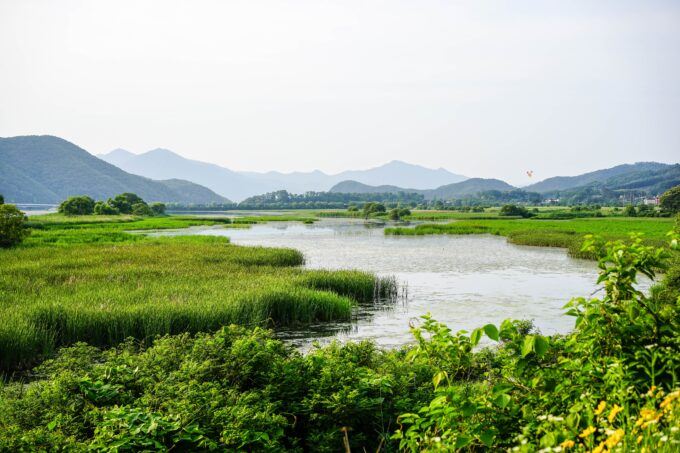Image by James Park.
The Supreme Court is effectively axing a major component of the Clean Water Act, rolling back 50 years of wetland protection in a declaration of war against nature by changing a word in the text of the Clean Water Act.
Seldom, if ever, will repercussions of a Supreme Court decision be so far-reaching and detrimental to life for the planet. It’s a dagger strike deep into the heart of the world’s most significant life source. Alito changing the text of the Clean Water Act is guaranteed to bring forth much, much worse flooding, especially along coastlines as sea levels rise from global warming; it’ll engender new sources of pollution of streams and lakes and bring on huge losses in biodiversity and crush the beauty of nature displaced by concrete, asphalt and development. Most importantly, aquifers depend upon wetlands for replenishment.
The Supreme Ct ruling in Sackett v. EPA effectively reverses what the Intergovernmental Panel on Climate Change -IPCC- stands for in its fight against climate change and global warming’s impact on the planet’s life support ecosystems.
Wetlands are warriors. By far, the most effective fighters against the ravages of climate change, for example, they are: (1) carbon sinks that sequester 10 times more carbon than mature tropical forests; studies show they outperform lame, insufficient carbon capture and sequestration machines, which will never get the job done (2) natural line of defense against flooding (3) home to 40% of all the world’s species (4) a major component for nature’s hydrology system, filtering/cleansing water for streams and lakes and most significantly, replenishing aquifers. Without wetlands, rainfall follows concrete, asphalt, development channels away from aquifers. NASA claims 1/3rd of the world’s largest aquifers to be dangerously stressed, e.g., portions of the Ogallala aquifer in the Texas Panhandle have gone dry and in west-central Kansas the Ogallala aquifer has gone dry. The Ogallala is the largest aquifer, by volume, in the world, underlying 8 states.
Hurricane Sandy, one of the worst storms to hit the East Coast in 2012 was checked by wetlands, e.g., according to Zurich Insurance, the four states with the most wetland coverage had flood damage reduced by up to 30% compared to unprotected areas. In New Jersey, with only 10% wetland coverage, the state saved $430M in flood damage because of wetland protection. (Source: Why Are Wetlands Important to People and Planet? Zurich, February 2, 2023)
“The world’s wetlands are some of our most biodiverse and important ecosystems,” John Scott, Head of Sustainability Risk at Zurich Insurance Group.
“The Court’s decision will open millions of acres of wetlands—all formerly protected by the Clean Water Act—to pollution and destruction,” the Sierra Club.
In the Sacketts’ case, the Supremes ruled that the Clean Water Act only concerns wetlands that are connected to larger bodies of water such as oceans, rivers and lakes. Anything adjacent doesn’t count.
The Biden administration disagrees: “The Supreme Court’s disappointing decision in Sackett v. EPA will take our country backwards,’ Biden said in a statement.” (Source: US Supreme Court Deals Setback to Clean Water Law, Phys.org, May 25, 2023)
“It puts our nation’s wetlands—and the rivers, streams, lakes, and ponds connected to them—at risk of pollution and destruction, jeopardizing the sources of clean water that millions of American families, farmers, and businesses rely on,’ the president said,” Ibid.
The Sackett decision literally re-writes congressional legislation. Brett Kavanaugh took exception, scolding Samuel Alito for taking liberties with congressional law, changing text by crossing out the word ‘adjacent” and replacing it to effectively say: Yes, landowners have as much latitude as they deem necessary to disrupt, destroy, and build upon the planet’s most valuable ecosystems.
“Justice Samuel Alito’s opinion for the court is remarkably brazen about this approach—so brazen that Justice Brett Kavanaugh (of all people!) authored a sharp opinion accusing him of failing to “stick to the text.” (Source: Samuel Alito’s Assault on Wetlands Is So Indefensible That He Lost Brett Kavanaugh, Slate, May 25, 2023)
“The court has anointed itself the final arbiter of every controversy in the land, and if it thinks the Clean Water Act goes too far, then, well, it’s the court’s sacred duty to rewrite it. As Kagan put it ruefully: ‘That is not how I think our government should work,’ because ‘it is not how the Constitution thinks our government should work.” Ibid.
But isn’t the Court supposed to follow the Constitution? Not this Court.


Add new comment